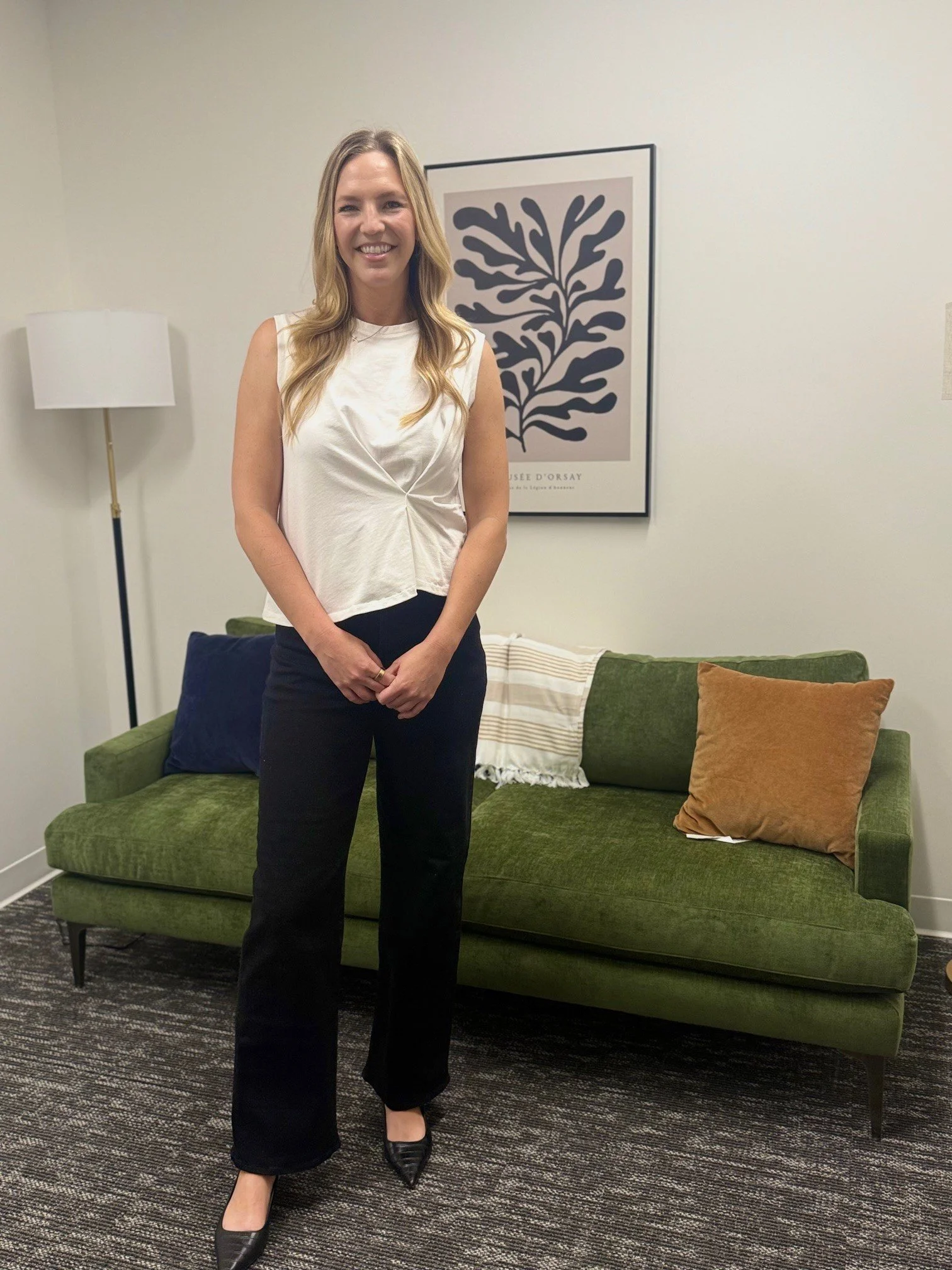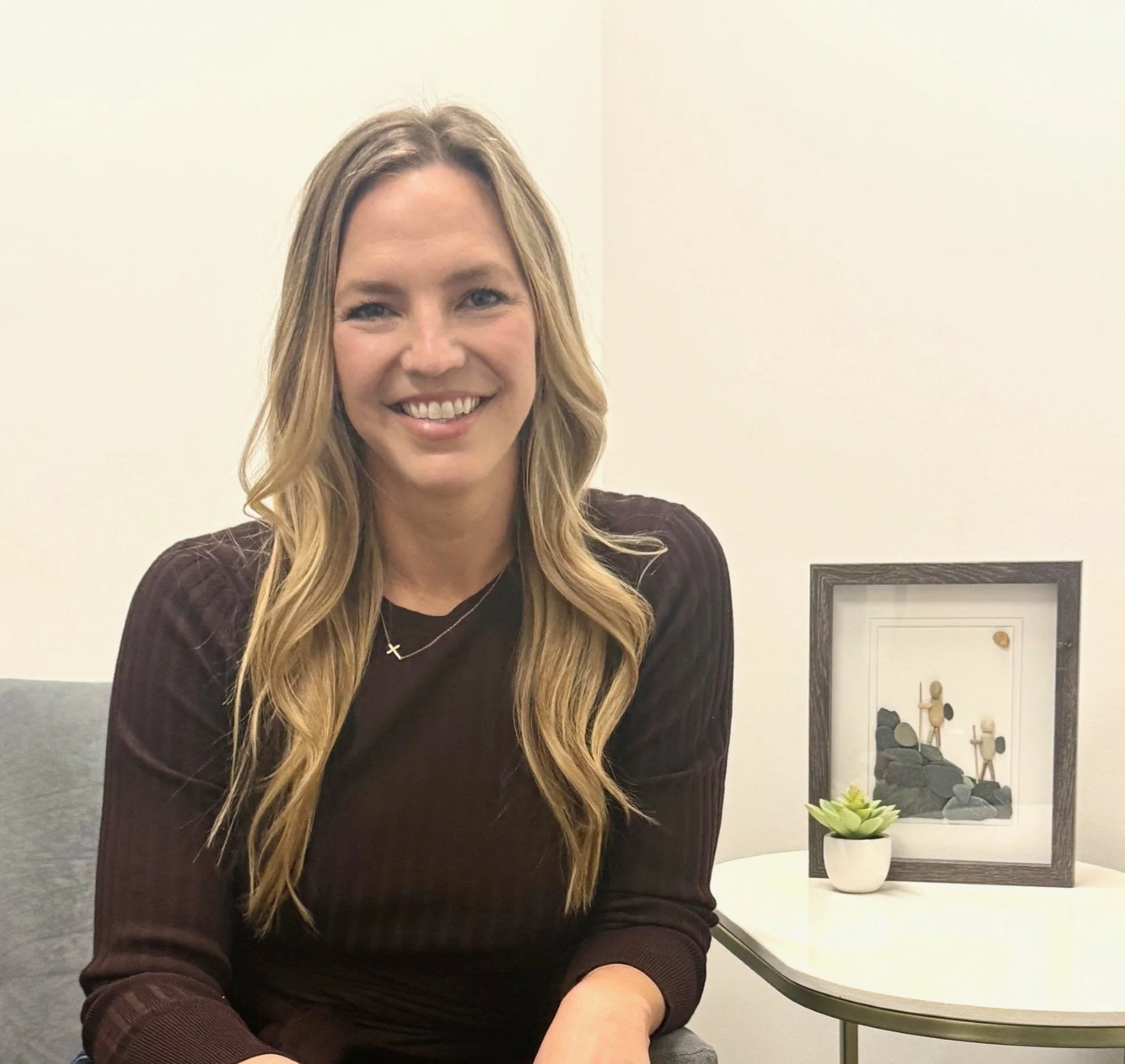Grief, relationship, and premarital counseling for adult individuals and couples in Dallas and Texas.
Grieve through loss and find relief, repair, and renewal in your relationship with yourself and others.
Lucy Keith
Licensed Marriage & Family Therapist Associate, Licensed Professional Counselor Associate
MOVE FORWARD
Grief & loss counseling
For those experiencing unexpected or expected loss, or perhaps life just isn't looking the way you planned, it's time to let the pain surface. Death, diagnosis, disappointments, unmet expectations, mistakes, heartbreak and betrayal...the painful parts of life do come. But while pain is inevitable, suffering is optional. Together we can bear witness to and process grief exactly as it comes – which typically is a messy mix of complex, confusing feelings – and, when ready, move forward to meaningfully re-engage with life and love.
Here to help you…
MOVE CLOSER
Relationship & couples counseling
Let's face it; we need each other. We have a fundamental need for connection and emotional safety with others. When this is threatened, our health, longevity, and quality of life are implicated. It's about more than communication and conflict resolution skills, we must address the deeper wounds and vulnerabilities influencing our most distressing relational dynamics to create or strengthen our emotional bonds. Whether in romantic or familial relationships or friendships, let's move closer to connection and restoration.
Also, sometimes the "move" actually needs to bring more distance. A move towards relief, resolution or unrequited closure with another. And that's okay, too.
MOVE WITHIN
Personal growth counseling
Sometimes we can't put our finger on why, but we know we've lost ourself. We've lost connection to who we are, what we care about or where we're headed. Somewhere along the way, the stress and overwhelm, the anxiety, the guilt and shame, or the expectations took over. Maybe you've become burnt out, reactive, irritable, withdrawn, or merely unmotivated. Together we can unburden yourself from the things blocking your growth, performance, and wellbeing. Through deepening our understanding of our values, beliefs, worth, and purpose as well as our more unfavorable emotional responses and patterns of behaviors, we'll increase your self-awareness, self-compassion and, ultimately, self-acceptance and begin making life changes aligned with your new goals. It's time to move within to reclaim yourself and restore emotional balance.
About
I believe
You’ve heard the old adage, “the only way out is through.” But, through what exactly?
For me, the only way out is through feeling.
You see, we have these emotions – brief, intense, impulsive reactions and sensations in our body – and they rule our inner and outer worlds demanding our attention. But thank goodness for that, because emotions let us know we’re alive. They are always trying to tell us something – what we need/want, what we need to do, and what motivates us. They tell us what matters.
They also must be felt.
Because it’s through feeling that we make sense and assign meaning to the emotions. It’s what we decide we're feeling – whether true or not and influenced by everything that’s ever happened to us – that determines our thoughts, behaviors, identity, and decision-making.
But that’s the hard part. It’s hard to feel, it's really, really, hard.
Ever wonder why it’s so exhausting and distressing when we fight those feelings - bury them, control them, judge them, or avoid them.
We’re fighting what’s natural. We were made with emotions and for emotional experiences. They are what connect us to ourself, to others, to God, to nature, and more.
But, you need to be willing to go there.
I’m going to help you feel and help you move...forward, closer, within.
My credentials & experience
I am dual licensed as a Licensed Marriage and Family Therapist Associate and Licensed Professional Counselor Associate and receiving supervision from Diana Walla, MS, LPC-S, LMFT-S. I received my Master of Science in Counseling from Southern Methodist University’s CACREP-accredited program in Dallas, TX, which included completing my clinical sequence in a private practice setting working with individuals, couples, and groups experiencing relational and familial conflict, anxiety, depression, and grief.
I also hold a Bachelor of Science in Public Relations from The University of Texas in Austin, where I was a Division I student-athlete on the women’s varsity soccer team. (Hook ‘em.) My background in team athletics had me wired at a young age for the never-ending pursuit of perfection progress and resilience as well as emotional connection with and dependance on others, which has fed nicely into my passion today for personal growth and helping clients reach their full potential.
I also want you to know this is a second career for me. For more than a decade I’ve dedicated much of my time and energy to a wonderful career at a global PR and marketing agency. There are many transferable skills, including an understanding of the demands of a fast-paced workplace, that I look forward to bringing to my practice. It wasn’t easy making the pivot, but I shook it all up to be here because I believe in this work and I believe in you.
My approach
My roots in emotionally focused therapy and attachment science also pull from family systems and humanistic, person-centered approaches. I see my clients as a whole person in the context of your relationships, believing our distressing emotions, thoughts, and behaviors make sense within the systems we live in (i.e., family, romantic relationships, friendships, workplace, sports teammates).
As a relational therapist, I believe relationships and connection are at the heart of healing and growth, and therefore I prioritize our therapeutic relationship above all else. Our earliest sessions I focus heavily on building trust and a secure bond with you. From there, my work becomes a way of being with you, relating, validating, accepting, experiencing, questioning, and challenging. I am not a “blank slate” therapist; I will be myself, so you can be yourself. I am not pathologizing. I am culturally- and circumstantially sensitive and work well with clients from all backgrounds, beliefs, and walks of life. I’ve always cared deeply about people and their unique stories, and like most therapists I have personal life experiences that led me to pursue a job dedicated to helping others move through their greatest struggles. I will come alongside you, emotionally engaged in your story and experiences as we improve your wellbeing and work towards achieving your therapeutic goals.
I also know every client is unique and will respond differently to various approaches and, therefore, may need different interventions. I love to bring my clients what is best for them and may pull from other evidence-based and empirically supported theories and modalities. It may take us some time to find what you best respond to (because I get it; not everyone loves emotions as much as I do).
-
Emotionally Focused Couples Therapy (EFCT) holds the belief that a couple's distress is rooted in attachment insecurity and emotional disconnection. The focus is on the role of emotions and the subconscious/automatic, but predictable sequences of reactions/responses to their partner's behaviors that stir up strong emotions and fear. Anchored in vulnerability and experiential re-enactments, the therapist helps the couple expand and restructure emotional experiences to develop a safe, secure bond and improve emotional connection/responsiveness as well as establish new interactional patterns and strengthen the relationship overall.
With Emotionally Focused Individual Therapy (EFIT), constricted view of oneself and others as well as emotional suppression are causing your distress. Through corrective emotional experiences we can positively impact and expand our connection to self and others, ultimately restoring balance, agency, and understanding. The therapist is highly attuned and engaged in the moment with the client and works with the client to integrate changes into their identify, life story, and patterns of behavior.
-
The belief that a family is an interconnected, emotional system whereas one member’s action or emotions affect the unit. Systems work helps clients explore their struggles in the context of their relationships, increasing self-awareness and awareness of dysfunctional patterns and agreements in the family. Through that awareness, one learns to alter family dynamics, or how to live within and not react to those dynamics that you can’t change, to achieve overall healthier functioning of the individual and the system. Therapist believes thoughts, emotions and behaviors make sense within the systems we live in, and will have clients examine family structure, roles, agreements, boundaries, and generational patterns to achieve interdependence and improved functioning.
-
The belief that we develop narratives in our minds to give coherence and meaning to life experiences, which then influence how we interpret future experiences. Therapist helps the client become aware of the stories they're telling themself and the meaning they're assigning to experiences – to see the problem as the problem vs. themselves as the problem – then re-storying them to be aligned with a more positive perspective and preferred outcome.
-
The belief that the client is the expert on their life and possesses the ability for growth to become the fully functioning, self-actualized individual they long to be. Therapist provides constant empathy, genuineness and unconditional positive regard.
-
A framework for helping clients make life decisions based on values. The theory promotes helping clients acknowledge and embrace their thoughts and emotions, but quick releasing those that are a hindrance and keep them from reaching their full potential. Therapist helps clients take an action-oriented approach through values exploration, acceptance, mindfulness, and detaching from thoughts through cognitive diffusion.
-
The belief that a couple's inability to repair is their main issue and perpetual problems are fueling negative interactions and patterns. Therapist helps the couple build a "Sound Relationship House" (involves love mapping, practicing sharing fondness and admiration, turning towards your partner, maintaining positive perspectives, better managing conflict, working toward dreams, and creating shared meaning together) to improve the couple's understanding of each other and increase positive interactions while decreasing negative ones.
-
Overlapping yet distinct, mindfulness and somatic tools are an effective supplement to talk therapy to regulate oneself and deepen client awareness and connection to the self and present.
Somatic techniques honor and harness the deep connection between the mind and body, and are based in the understanding that our greatest emotional and traumatic experiences are stored in the body. Nervous system regulation is key and practiced consistently, while techniques such as body scans and resourcing help clients pay attention to the sensations, tension, and pain in our bodies.
Mindfulness is all about staying in the present moment without judging yourself or trying to change what thoughts and emotions come up. Techniques like breathwork, mindful movements, and meditation focus on pulling you out of the past or the future and into the here-and-now.
-
The belief that our maladaptive thoughts (I.e., cognitive distortions and schemas) are causing dysfunctional emotions and behaviors, and if we can modify our thoughts we can find relief. Therapist provides a lot of structure, goal-setting, and in-session and out-of-session assignments focused on reframing and restructuring cognitions to increase awareness of our thoughts and their impact.
But do I really need therapy?
I hear you. I have amazing friends and family support, too. But sometimes we need the safety and objective perspective of a trained professional.
While I do hope you enjoy our therapeutic relationship and time together, you will also benefit from clinical and evidence-based approaches to your problems in a confidential and judgment-free environment.
Plus, with therapy, it’s all about you.
Here are some things you may be doing, thinking or feeling if it’s time to consider therapy.
Your daily functioning and completion of tasks is suffering in multiple areas of your life (i.e., home, work, school, etc.).
Your problems seem persistent and managing your emotions feels overwhelming; they may also be increasingly distressing.
You're beginning to feel like a broken record to loved ones, but you just can’t let something or someone go. Perhaps you’ve stopped sharing altogether or find yourself lying to loved ones about the things you’re struggling with.
You’ve lost control of healthy routines and habits, and are reaching for coping mechanisms that only seem to make things worse.
Your relationships feel strained and unnurtured. You and your partner are experiencing persistent conflict, disconnection, or loss of intimacy or trust.
You're having difficulty being kind to yourself.
You’ve got “would’ve, could’ve, should've” and other negative self-talk on repeat in your head.
The well-intentioned advice from loved ones isn’t resulting in any real changes in your behaviors and wellbeing.
Rock Relational Therapy
Rocks have a lot of symbolism across many cultures and religions…
They represent strength, steadiness, and stability. They are foundational and resilient. With rock, you can rebuild.
Most importantly, they are constantly being broken down and transformed. They are formed over time by many different things (i.e., minerals and particles) through slow and steady processes.
With my relational and systemic approaches, I see humans this way. We are influenced and formed by many different things (i.e., experiences, upbringing, relationships), and must learn to accept that we are always changing with self-compassion and courage. So that, in the times when we are being broken down, we can greet those challenges expectantly knowing transformation is to come.
We can be our own rock; and can serve as a rock to others. I believe God is my rock and He fuels my ability to do this work.
Relational therapy is also in the name, emphasizing the fundamental importance of secure relationships while still promoting your individual wellbeing.






